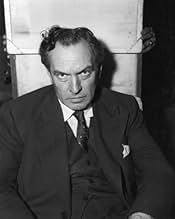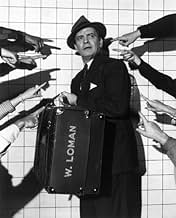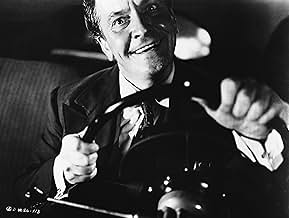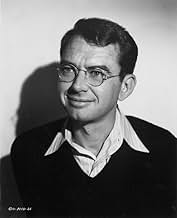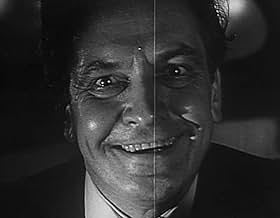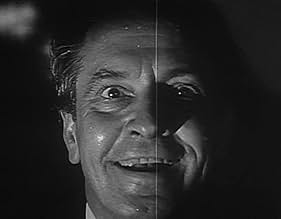AVALIAÇÃO DA IMDb
7,2/10
1,3 mil
SUA AVALIAÇÃO
Adicionar um enredo no seu idiomaAn over-the-hill salesman faces a personal turning point when he loses his job and attempts to make peace with his family.An over-the-hill salesman faces a personal turning point when he loses his job and attempts to make peace with his family.An over-the-hill salesman faces a personal turning point when he loses his job and attempts to make peace with his family.
- Direção
- Roteiristas
- Artistas
- Indicado a 5 Oscars
- 8 vitórias e 11 indicações no total
Beverly Aadland
- Girl
- (não creditado)
Jeanne Bates
- Mother
- (não creditado)
Gail Bonney
- Mother
- (não creditado)
Roger Broaddus
- Boy
- (não creditado)
Paul Bryar
- Subway Guard
- (não creditado)
Patricia Edwards
- Letta
- (não creditado)
Elisabeth Fraser
- Miss Forsythe
- (não creditado)
Charles Morton
- Subway Passenger
- (não creditado)
- Direção
- Roteiristas
- Elenco e equipe completos
- Produção, bilheteria e muito mais no IMDbPro
Avaliações em destaque
The main question is, how does the Fredric March version stack up against the Lee J. Cobb version. The answer is very well; it's probably a dead heat. Lee J. Cobb's performance has long been legendary, but March's was a little more emotionally authentic and agonizing.
Some critics objected that his Willy made the man seem insane and that insanity would rule out tragedy as the genre of the play/film. But King Lear went mad in the course of the play, and Strindberg's The Father involves madness in the protagonist. There is no point denying the evidence of the play itself in order to satisfy a theoretical rule that, at the same time, is violated in other plays. And the main evidence is that Willy got so involved with his memories that some of them became hallucinatory, especially in the office scene after he was let go from his job. Yes, there were numerous flashbacks in the play, but other scenes from the past took place in his mind and at times he became disoriented, talking loudly to absent characters such as his brother.
I found the Dustin Hoffman version not on the same level as the Fredric March or Lee J. Cobb version. Hoffman pushed method acting too much and was too young to portray a man in his early sixties.
I saw the Fredric March version in 1951 or 1952. Because of Arthur Miller's defiance of HUAC, the American Legion picketed the film and it was rarely if ever screened after that, until it was reissued as a DVD quite recently.
Some critics objected that his Willy made the man seem insane and that insanity would rule out tragedy as the genre of the play/film. But King Lear went mad in the course of the play, and Strindberg's The Father involves madness in the protagonist. There is no point denying the evidence of the play itself in order to satisfy a theoretical rule that, at the same time, is violated in other plays. And the main evidence is that Willy got so involved with his memories that some of them became hallucinatory, especially in the office scene after he was let go from his job. Yes, there were numerous flashbacks in the play, but other scenes from the past took place in his mind and at times he became disoriented, talking loudly to absent characters such as his brother.
I found the Dustin Hoffman version not on the same level as the Fredric March or Lee J. Cobb version. Hoffman pushed method acting too much and was too young to portray a man in his early sixties.
I saw the Fredric March version in 1951 or 1952. Because of Arthur Miller's defiance of HUAC, the American Legion picketed the film and it was rarely if ever screened after that, until it was reissued as a DVD quite recently.
Fredric March was one of the greatest film actors ever. He played some roles in his career that were meant to be "over the top" in their delivery. Among these were Dr. Jekyll and Mr. Hyde, Inherit the Wind and The Iceman Cometh. In "Iceman" he was brilliant, but few people have seen this performance. I do not think the character of Willy Loman was meant to be so "over the top" as March portrays him in this film. He is overly loud and manic here IMO, and it does not entirely work. Cobb originated the role on Broadway, and I liked his performance (when it was done for TV) better than this one. But, do see this one if you are a student of the play. Mildred Dunnock is always worth watching.
Arthur Miller justifiably received a lot of acclaim for his Broadway stage version of DEATH OF A SALESMAN and this film version starring FREDRIC MARCH as Willie Loman is a faithful transfer of that work.
March is outstanding in his portrayal of a bitterly confused man who can't fathom why his life went so wrong, and CAMERON MITCHELL and KEVIN McCARTHY do outstanding work as the sons who are disillusioned by their father's failure. But the most memorable performance, in my estimation, comes from MILDRED DUNNOCK, who would go on to play similarly bitter women in her future roles on screen. But here she is poignant in what has to be one of the best character roles she ever had.
Surprisingly, the film is little seen today, seldom revived and largely forgotten. BRIAN DENNEHY did have success in a recent Broadway version and DUSTIN Hoffman has performed the role on TV. But the Fredric March version deserves to be seen, however heavy-handed the material is.
It's an exhausting experience, a story of one man's failure in life's journey, but dramatically very effective and it still has a lot to say.
March is outstanding in his portrayal of a bitterly confused man who can't fathom why his life went so wrong, and CAMERON MITCHELL and KEVIN McCARTHY do outstanding work as the sons who are disillusioned by their father's failure. But the most memorable performance, in my estimation, comes from MILDRED DUNNOCK, who would go on to play similarly bitter women in her future roles on screen. But here she is poignant in what has to be one of the best character roles she ever had.
Surprisingly, the film is little seen today, seldom revived and largely forgotten. BRIAN DENNEHY did have success in a recent Broadway version and DUSTIN Hoffman has performed the role on TV. But the Fredric March version deserves to be seen, however heavy-handed the material is.
It's an exhausting experience, a story of one man's failure in life's journey, but dramatically very effective and it still has a lot to say.
This all but lost 1951 version of Arthur Miller's American masterpiece was nominated for several prestigious Academy Awards in 1952, including Best Picture. That it has never been officially released on video is a shame, for, quite simply, Fredric March's go around as Willy Loman is a absolute treasure. The supporting cast are uniformly excellent; the mood and tone are consistently melancholy; the sets are spare, even stagy; and, most important, the pace is as brisk as this play will allow. Please search out this one out on TV-- you will not be disappointed.
For reasons unknown to me, this version of the film has been unavailable for years. When I finally was able to view it recently, I thought it was excellent, and that Frederic March was the ideal Willy Loman. Played on Broadway by Lee J. Cobb, George C. Scott and Brian Dennehy, powerful men with powerful presences, the role has the potential to make Willy's downfall extremely dramatic, a testament to how far the mighty can fall. But in Frederic March, we better see his inherent weakness, and believe his corruption. We're not tricked into believing that his life's work was ever worthwhile, that it just fell on hard times. Instead, we see that his life was a lie from the beginning, which is what I believe the play intends.
Dustin Hoffman, another great actor, also famously played the role on Broadway and in the TV version of that production, widely available on video and therefore perhaps the version most viewers are familiar with. His interpretation was quirky and unreal, a character actor playing the lead in a modern take on a Greek tragedy, and it didn't work for me. But no matter how you feel about the play and the role, if you can catch this Frederic March version, do so; you won't regret it.
Dustin Hoffman, another great actor, also famously played the role on Broadway and in the TV version of that production, widely available on video and therefore perhaps the version most viewers are familiar with. His interpretation was quirky and unreal, a character actor playing the lead in a modern take on a Greek tragedy, and it didn't work for me. But no matter how you feel about the play and the role, if you can catch this Frederic March version, do so; you won't regret it.
Você sabia?
- CuriosidadesAccording to Arthur Miller, in a 2000 essay entitled, "Are You Now Or Were You Ever?" Columbia asked Miller to sign an anti-Communist declaration to ward off the threat of picket lines by the American Legion at theaters showing "Death of a Salesman". He refused. Instead, Columbia made another movie, a short film entitled "Life of a Salesman" to be shown with it. The short consisted of business professors from City College praising sales as a profession, and denouncing the character of Willy Loman. Miller wrote: "Never in show-business history has a studio spent so much good money to prove that its feature film was pointless."
- ConexõesFeatured in Prêt-à-jeter (2010)
Principais escolhas
Faça login para avaliar e ver a lista de recomendações personalizadas
- How long is Death of a Salesman?Fornecido pela Alexa
Detalhes
- Data de lançamento
- País de origem
- Central de atendimento oficial
- Idioma
- Também conhecido como
- Death of a Salesman
- Empresa de produção
- Consulte mais créditos da empresa na IMDbPro
- Tempo de duração1 hora 55 minutos
- Cor
- Proporção
- 1.37 : 1
Contribua para esta página
Sugerir uma alteração ou adicionar conteúdo ausente

Principal brecha
By what name was A Morte do Caixeiro Viajante (1951) officially released in India in English?
Responda
